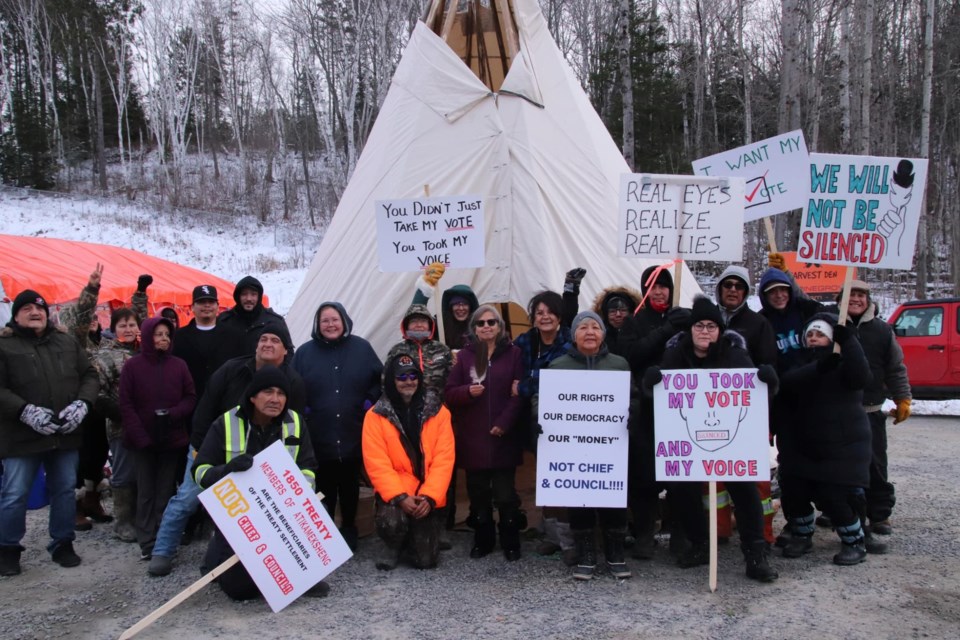The protesters in place at the entrance to Atikameksheng Anishnawbek since Nov. 19 have been told it’s time to pack up and go.
Based on what they state concern for public safety and upcoming construction projects, as well as employee safety, Atikameksheng Anishnabek’s Chief Administration Officer, Dennis Cropper, is “respectfully requesting” that the Atikameksheng Strong blockade be “dismantled and vacated by March. 28.”
But Suzanne Shawbonquit, who ran for Chief of Atikameksheng (losing by just nine votes) and is a leader with the protesters, told Sudbury.com in an interview —and told Atikameksheng Strong members on Facebook — that they aren’t going anywhere.
“Atikameksheng members never stand down when seeking the truth, transparency, justice and fairness,” she wrote on Facebook. “Our community deserves it, and our children deserve to grow up in a community that reflects those values.”
In place since Nov. 19, Atikameksheng Strong has been holding the line at the entrance to Atikameksheng on Reserve Road. Their demands centre around their right to vote on the monies coming in from the $10-billion settlement at the heart of the Robinson Huron Treaty Annuities case, and how much of that money will be given to the members, versus how much will be kept by the band.
Travellers who wish to enter or exit the reserve are being stopped briefly, and asked to read the protest signs carried by the 20 protesters, which show messages such as “Gimaa and council work for the members,” and “I want my right to vote.”
Though they requested that their elected representative, Gimaa (chief) Craig Nootchtai, meet with them to discuss their concerns, they were told he would not speak with them until Feb. 22 — 95 days since the blockade began. A meeting was held on that date, but it was an information session for any member of Atikameksheng Anishnawbek to attend, and Shawbonquit said it was not the discussion they were looking for.
That’s why Atikameksheng Strong continues the blockade.
The letter from Cropper, who is also the interim chief executive officer, states the reason for the request comes down to construction activities, including the removal of logs from the land, construction in the business park and fuel-blending facility. The letter states that this will involve the movement of large trucks carrying logs and equipment to and from the land.
“The presence of the encampment, as well as associated vehicles, renders safe passage in the area unfeasible, putting our employees, partners and the individuals at the encampment at risk,” wrote Cropper.
He also notes that “partners and employees who have responsibilities within the business park have expressed discomfort with passing through the encampment, which is impeding their ability to perform their work. This has created challenges in maintaining the progress of our collective initiatives.”
Cropper writes that these projects are critical to the economic development and growth of Atikameksheng Aniushnawbek and are essential for their journey towards independence, sovereignty and self-determination — benefitting both present and future generations of the nation.
“We fully recognize and respect your commitment to the values and priorities of our community,” he writes. “In the spirit of unity and collaboration, we ask for your co-operation to ensure that we can continue this important work for the betterment of everyone.”
Shawbonquit told Sudbury.com she met with the OPP on Nov. 18, the day before the blockade began, and has had them onsite since they began the protest to ensure the safety of all. She said all the Atikamensheng Strong members want is answers.
“Transparency and accountability is not their priority as an Indian agent of the government,” she wrote, referring to the chief and council system of governing that is the product of the Canadian government.
“To date we have received not one response from the Indian Act Chief and Council from Atikameksheng for any information,” said Shawbonquit. “Instead, what we have received is continued public humiliation and shaming through lengthy letters, memos and in public community meetings.”
She said that the Atikameksheng administration's “public shaming” is a form of punishment to dishonour and disgrace Atikameksheng members.
“It's text book bullying from people in authority positions,” she wrote on Facebook. “This memo/letter below is just another example of public shaming, false transparency and manipulation.”
Despite repeated requests by phone, text and email, Nootchtai, through band public relations officer Shawn McLaren, has repeatedly refused to speak with Sudbury.com about the issue.
Jenny Lamothe covers vulnerable and marginalized populations, as well as housing issues and the justice system for Sudbury.com




